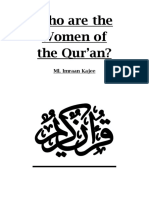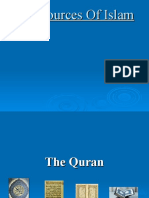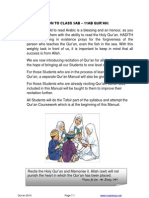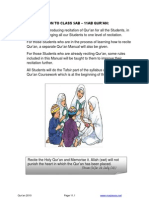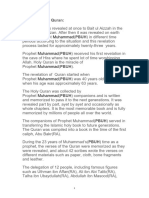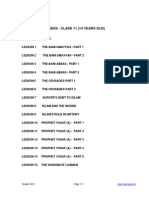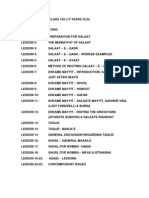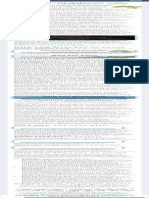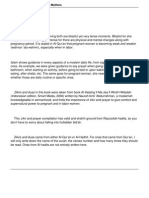Introduction To Class 5ab - 11ab Qur'An:: (Imam Ja'far As Sadiq (A) )
Introduction To Class 5ab - 11ab Qur'An:: (Imam Ja'far As Sadiq (A) )
Uploaded by
almustafaphilsCopyright:
Available Formats
Introduction To Class 5ab - 11ab Qur'An:: (Imam Ja'far As Sadiq (A) )
Introduction To Class 5ab - 11ab Qur'An:: (Imam Ja'far As Sadiq (A) )
Uploaded by
almustafaphilsOriginal Title
Copyright
Available Formats
Share this document
Did you find this document useful?
Is this content inappropriate?
Copyright:
Available Formats
Introduction To Class 5ab - 11ab Qur'An:: (Imam Ja'far As Sadiq (A) )
Introduction To Class 5ab - 11ab Qur'An:: (Imam Ja'far As Sadiq (A) )
Uploaded by
almustafaphilsCopyright:
Available Formats
INTRODUCTION TO CLASS 5AB – 11AB QUR’AN:
Teaching a child to read Arabic is a blessing and an honour, as you
are equipping them with the ability to read the Holy Qur’an. HADITH
about everything in existence prays for the forgiveness of the
person who teaches the Qur’an, even the fish in the sea. With this
weighty task in front of us, it is important to keep in mind that all
success is from Allah.
We are now introducing recitation of Qur’an for all the Students, in
the hope of bringing all our Students to one level of recitation.
For those Students who are in the process of learning how to recite
Qur’an, a separate Qur’an Manual will also be given.
For those Students who are already reciting Qur’an, some rules
included in this Manual will be taught to them to improve their
recitation further.
All Students will do the Tafsir part of the syllabus and attempt the
Qur’an Coursework which is at the beginning of this Manual.
Recite the Holy Qur’an and Memorise it. Allah (swt) will not
punish the heart in which the Qur’an has been placed.
(Imam Ja’far As Sadiq (A))
Qur’an 2010 Page 5.1 www.madressa.net
QUR’AN SYLLABUS CLASS 5 (8 YEARS OLD)
LESSON: TOPIC
LESSON 1: THE RESPECT OF THE HOLY QUR’AN AND
THE AKHLAQ OF ITS RECITATION
LESSON 2: AN INTRODUCTION TO THE HOLY QUR’AN
LESSON 3: DIVISIONS IN THE HOLY QUR’AN
LESSON 4: TAFSIR OF SURATUL IKHLAS
LESSON 5: TAFSIR OF SURATUL NAAS
LESSON 6: TAFSIR OF SURATUL KAUTHAR
LEVEL 5: FURTHER RULES FOR CHILDREN WHO CAN RECITE QUR’AN:
- PUNCTUATION
- QALQALA
- RULES OF LAAM
- RULES OF NOON AND MEEM MUSHADDADAH
- WAJIB SAJDAHS IN THE QUR’AN
- ARABIC NUMBERS
Qur’an 2010 Page 5.2 www.madressa.net
LESSON 1: THE RESPECT OF THE HOLY QUR’AN AND THE AKHLAQ OF ITS
RECITATION
The Holy Qur'an is a book containing the words of Allah. It should be treated with the
respect it deserves. This respect should also extend to any book, such as this manual,
wherein there are verses of the Holy Qur’an.
In this lesson we will learn how to respect the Holy Qur’an and how to recite it.
1. The words of the Holy Qur'an should only be touched after doing
Wudhu. Allah says: None should touch it except the purified.(al-Wáqi`áh, 56:79)
2. Always begin the recitation with Ta`awwudh. Allah says:
When you recite the Qur’an, seek refuge in Allah from Shaitan, the accursed
(an-Nahl, 16:98)
Ta`awwudh means to recite øÁæÎêUìj»A øÆBòñæÎìr»A äÅê¿ êÉé}¼»BøI ågæÌå§òA
Which means, “I seek refuge in Allah, from Shaitan, the accursed.
3. After Ta`awwudh, recite ãÈ×ãcáäoÂB ãÌÇåcáäoÂB ãÐÃÂB ãÈåtãQ which means,
“I begin in the name of Allah, The Beneficent, The Merciful”.
4. Even if you know the verses by heart, it is better to recite while looking at the words,
as this increases the rewards many times.
5. It is Mustahab to recite the Holy Qur'an with your head covered and while facing the
Qiblah.
Cover the head Face Qiblah
Qur’an 2010 Page 5.3 www.madressa.net
6. The Holy Qur’an should be recited without rushing, in a clear manner.
Allah says:
ý4þ æÚ×ãWåoáW áÉDåoâ»åÂB ãÄãäWánáÑ
And recite the Qur’an in a regulated tone. (Al-Muzzammil, 73:4)
7. When the Qur’an is being recited, listen attentively and do not eat or talk.
Allah says:
And when the Qur’an is recited, listen to it with (full) attention, so that you may
be blessed with mercy. (Al-A`raf, 7:204)
8. Do not leave the Holy Qur'an open and unattended or in a place where it may be
disrespected. Recite from it regularly and do not leave it unread on the shelf.
Allah says:
And the Prophet (S) shall say, “O my Lord! Verily my people abandoned this
Qur’an.” (Al-Furqan, 25:30)
10. Worn-out pages of the Holy Qur'an or paper with verses of the
Holy Qur'an must not be thrown in the bin, Instead they should be
Re-cycled or buried.
References
Holy Qur’an, Tafsir of S V Mir Ahmed Ali
The Science of Reciting the Qur’an, M Surty, Pages 30-34
Qur’an 2010 Page 5.4 www.madressa.net
LESSON 2: AN INTRODUCTION TO THE HOLY QUR’AN
Allah sent 124,000 Prophets for the guidance of mankind. To some of these Prophets,
he gave a set of rules and instructions that the prophets left behind in the form of
books.
The Divine Books were:
ZABUR To
TAWRAT to
Prophet Dawood (A)
Prophet Musa (A)
INJIL to QUR’AN To
Prophet Isa (A) Prophet Muhammad (S)
According to many traditions, the revelation of the Holy Qur’an began on the 23rd night
of the month of Ramadhan (Laylatul Qadr). They began when the Prophet (S) was 40
years old and continued for the next 23 years.
The Holy Qur’an broadly contains:
1. Ahkam: These are verses about the Furu’-e-Din from which the
Mujtahidín prepare the various Fatwas to do with Salaat, Sawm,
Haj etc.
2. Tareekh: These are the verses that narrate the history of people
who lived before our Holy Prophet (S).
3. `Aqa’id: These are verses that explain the Belief in the Unity of Allah, the Prophet
(S) and the Day of Judgement.
TAWHEED ADAALAT NABUWWAT IMAAMAT QIYAAMAT
4. Akhlaq: The verses outline the moral behaviour
that Muslims are required to observe.
Qur’an 2010 Page 5.5 www.madressa.net
The Holy Qur’an therefore contains guidance that teaches a man about:
- His duties to himself i.e. how to lead a successful life in this world and the
hereafter.
- How to act with other people i.e. how to contribute as an individual towards the
betterment of society.
- His duty to his Creator i.e. how to worship Allah.
Merits of Recital of the Holy Qur’an
There are many Ahadith (sayings) of the Holy Prophet (S) and our Aimmah (A) on the
reward and blessing of reciting the Holy Qur’an. Only some are quoted here:
The Prophet (S) has said, “The most excellent amongst you is the one who learns the
Qur’an and teaches it to others.”
“The more Qur’an is recited in a home, the greater the good for it. The lives of the
people in the house are made easier. When the angels view this house from the
heavens they see it shining in the same way as stars seen from the earth.”
“The heart gathers rust just like iron; remove this rust by reciting the Qur’an.”
Imam `Ali (A) has said,
“Whosoever recites 100 verses daily from the Book (Holy Qur’an) in the order it is in,
Alláh writes for him the reward equal to all the good actions of every one on this earth.”
Qur’an 2010 Page 5.6 www.madressa.net
LESSON 3: DIVISIONS IN THE HOLY QUR’AN
The text of the Holy Qur'an has been divided in various ways. These are:
1. Ayah pl. Ayat ( PBÍA , ÒÍA)
In `Arabic, Ayah means sign, and in the Holy Qur’an, it means a verse. Thus, each and
every verse of the Holy Qur'an is a sign of Allah. There are various numbers given for
the total Ayat in the Holy Qur'an. Syed Akhtar Rizvi mentions 6236 in his book “Qur’an
and Hadith”.
2. Súrah pl. Suwar (iÌm , ÑiÌm)
In `Arabic, Surah means an enclosure and in the Holy Qur'an, it means a chapter.
There are 114 Suwar in the Holy Qur'an. The longest of them is al-Baqarah with 286
Ayat, and the shortest is al-Kauthar with only 4 Ayat.
3. Manzil pl. Manázil ( ¾kBÄ¿ , ¾lÄ¿)
In `Arabic, Manzil means a phase. The Holy Qur'an has been divided into seven
Manázil, for convenience of recitation. So a person wishing to recite the entire Qur’an
in one week may do so by reciting one Manzil a day. Each such position in the Holy
Qur'an is marked by the word Manzil.
4. Juz’ pl. Ajza’( ÕAlUA , ÕlU)
The Muslims have divided the Holy Qur'an into 30 equal parts (Juz’ in `Arabic or Pára
in Urdu). This division is just for convenience. So a person who wishes to recite the
whole Qur’an in one month (as in the month of Ramadhan) may do so by reciting one
Juz’ every day. In the Holy Qur'an, the beginning of the Juz` is usually marked by a
blacked line.
5. Rub`, Nisf, Thalathah ( ÒQÝQA , ±và , ©Ii )
Each Juz’ is divided into quarters, again for the convenience of recitation into Rub`
(quarter), Nisf (half) and Thalathah (three-quarter, shortened to three).
6. Ruku`, pl. Rukuat ( PB§Ì·i , ªÌ·i )
These are like paragraphs or sections, containing 7-12 Ayat. For example, al-Fatihah
(1st Surah) has 7 Ayat, grouped in one Ruku`, while al-Baqarah (2nd Surah) has 286
Ayat, grouped into 40 Rukuat.
The place of Ruku` is denoted by the letter ª. The letter has three numbers, one at the
top, one in its middle and one below it.
The number at the top signifies the number that this Ruku` is in the Surah.
The number in the middle signifies the number of Ayat between the last Ruku`
and the present one.
The number at the bottom signifies the number that this Ruku` is in the Juz’.
So, in this example from Súrah al-Baqarah,
This is the 23rd Ruku` in the Surah,
there are 6 Ayat between Ruku` number 22 and 23, and this is the
7th Ruku’ in this Juz’
and this is the 7th Ruku` in this Juz’.
Qur’an 2010 Page 5.7 www.madressa.net
LESSON 4: SURATUL IKHLAS
Introduction
This Surah was revealed in Makka. It has four verses. It is Surah number 112 in the
Holy Qur’an. It is one of the most important Surahs of the Holy Qur’an.
When the Jews asked our Holy Prophet (S) to describe Allah, this Surah was revealed
in reply.
Al-Ikhlas means “The Unity”. The name of the Surah refers to the fact that this Surah
describes the qualities of Allah very well. That is why the Súrah is sometimes called
Tawhid.
Text and Translation
ãÈ×ãcáäoÂB ãÌÇåcáäoÂB ãÐÃÂB ãÈåtãQ
In the Name of Allah, the Beneficent the Merciful.
ý1þ çkácáF âÐáäÃÂB áÒâÎ åÄâº
Say, “He, Allah is ONE”
ý2þ âkáÇáä|ÂB âÐáäÃÂB
He needs nothing, but everything else needs Him.
ý3þ åkáÂÒâÖ åÈáÂáÑ åkãÃáÖ åÈáÂ
He does not have children, nor has He a parent
ý4þ çkácáF BæÒâ∙â¾ âÐáä Ìâ¿áÖ åÈáÂáÑ
And there is none other equal to Him.
Qur’an 2010 Page 5.8 www.madressa.net
Tafsir
Ayah 1. The word “Ahad” used for “one” in the verse is quite different from the usual
word for “one” which is “Wahid”.
Ahad means “one” which has no plural, no divisions and no second or third after it. It is
a unique “one” and is used for Allah only.
Ayah 2. “Samad” means independent - it means Allah does not need anyone or
anything, He is needed by everything.
Ayah 3. He does not have children or parents. He is not like us, who have a beginning
and an end.
Ayah 4. He is different from anything or anyone you can imagine. There is none who
can equal Him.
Merits of Recitation of Suratul Ikhlas
1. In Salaat, if you make an intention to recite it and start with its Bismillah, then you have to finish it. It
is Mustahab to recite this Surah at least once in every daily prayer. In fact, to recite the same
Surah in both Raka’ats of the prayer is Makruh, except for Suratul Ikhlas.
2. The Thawab of reciting this Surah three times is the same as that for finishing the recital of the
whole Qur’an.
3. When Suratul Ikhlas is recited once, Allah's blessings are showered on the reciter; twice, on his
family; and thrice, on his neighbours also.
4. While performing the funeral ceremonies of Sa'd bin Ma'ad, the Prophet (S) remarked that Jibrael
and other angels were with him because Sa'd was in the habit of reciting Suratul Ikhlas all the time.
Therefore Allah had rewarded him with this dignity.
References
Holy Qur’an, Tafsir by S V Mir Ahmed Ali
Ramadhan, Ahkam and Philosophy, Yasin T. al Jibouri
Qur’an 2010 Page 5.9 www.madressa.net
LESSON 5: SURATUN NAS
Introduction
This Surah was revealed in Makka. It has six verses. It is the last Surah (number 114)
in the Holy Qur’an.
An-Nas means “The People”. This Surah deals with asking for the help of Alláh against
the mischief of jinn and people.
Text and Translation
ãÈ×ãcáäoÂB ãÌÇåcáäoÂB ãÐÃÂB ãÈåtãQ
In the Name of Alláh, the Beneficent the Merciful.
ý1þ ãrCáäËÂB ãäPáoãQ âlÒâ®áF åÄâº
Say, “I seek refuge in the Lord of the people!
ý2þ ãrCáäËÂB ãÀãÃáÆ
The King of the people!
ý3þ ãrCáäËÂB ãÐáÂãH
The God of the people!
ý4þ ãrCáäËáhåÂB ãrBáÒåsáÒåÂB ãäoáw ÌãÆ
From the evil of the slinking whisperer
ý5þ ãrCáäËÂB ãnÑâkâ{ Ø㶠ârãÒåsáÒâÖ ÕãmáäÂB
Who whispers into the minds of the people
ý6þ ãrCáäËÂB áÑ ãUáäËã`åÂB áÌãÆ
(Be he) from among the Jinn or the Men.”
Qur’an 2010 Page 5.10 www.madressa.net
Tafsir
Ayah 1-3. Here we are seeking refuge in Allah by calling Him by different names. We
ask him as the Lord, Who looks after our individual needs. Then we ask him as the
King, Who looks after all his creation. Finally, we ask him as God, Whose will is always
done.
Ayah 4-5. The “Slinking Whisperer” here is Shaitan and his helpers, who lead us to
evil by suggesting bad things to us and then leaving us to suffer the consequences of
our wrong-doing.
Ayah 6. Those who suggest these bad things are from mankind as well as jinn. We
ask Alláh to protect us from them all.
Merits of reciting Suratun Nas:
1. It is recommended to recite this Surah daily before sleeping to keep away the evil of
jinn and man.
2. The Prophet (S) has said that one who recites both this Surah and the previous one
(al-Falaq) will be as though he recited all the Books which Allah Almighty has
revealed.
3. The Prophet (S) also ordered his companions to recite the two Surahs upon waking
up and upon going to bed.
References:
Holy Qur’an, Tafsir by S V Mir Ahmed Ali
Ramadhan, Ahkam and Philosophy, Yasin T. Al Jibouri
Qur’an 2010 Page 5.11 www.madressa.net
LESSON 6: SURAH AL-KAUTHAR
Introduction
This Surah was revealed in Makka. It has four verses. It is Surah number 108, and the
shortest Súrah in the Holy Qur’an.
When the Muslims asked the Holy Prophet (S) what the word Kauthar meant, he said
it was the name of a stream of great excellence in heaven. From this stream, the
righteous believers will drink. Thereafter the Holy Prophet (S) turned to Imám `Alí (A)
and said, “You will be the one who distributes the water of Kauthar”
Text and Translation
ãÈ×ãcáäoÂB ãÌÇåcáäoÂB ãÐÃÂB ãÈåtãQ
In the Name of Allah, the Beneficent, the Merciful
ý1þ áoá[åÒá¿åÂB á½CáËå×á§å®áF CáäÊãH
Verily (O Muhammad) We have given you The Kauthar (Abundance)
ý2þ åoádåÊBáÑ áÀãäQáoã ãäÄá|á¶
So pray unto your Lord, and offer sacrifice
ý3þ âoáXåQáåÛB áÒâÎ áÀáNãÊCáw áäÉãH
Verily your enemy shall be the one cut off (in his progeny)
Qur’an 2010 Page 5.12 www.madressa.net
Tafsir
Ayah 1. “Kauthar” also means abundance and refers to the abundant good given to
the Prophet (S) in this world and the hereafter.
Ayah 2. Although addressed to the Prophet (S), the instruction is for everyone who
has been abundantly blessed by Allah.
The one who wishes to get closer to Allah should do so by prayer and sacrifice.
Sacrifice here would mean to sacrifice your time, money and even your life in the way
of Allah.
Ayah 3. The male sons of the Prophet (S) all died in their infancy. When his son
Qasim died, some of the Quraish began to taunt him, calling him “Abtar”, a word for an
animal whose tail has been cut off. They meant that the Prophet (S) would have no
descendants.
In this verse Allah promises him that it would be his enemies and not he, who would
be “Abtar”. We can see the truth of that promise today; there are thousands of
descendants of the Prophet (S) today - we call them Sayyids. On the other hand, no
descendant of the early enemies of Islam can be found.
Merits of Reciting Súrah al-Kauthar
1. The Prophet (S) has said that Allah will let everyone who recites this Surah drink from
the rivers of Paradise and will give him of the rewards the equivalent to the number of
all sacrifices offered by the servants of Allah on the Day of Sacrifice (Eid al-Adha) or
any other sacrifice intended to seek His Pleasure.
2. Imam Ja`far as-Sadiq (A) has said that one who recites this Surah in his Wajib and
Mustahab prayers will be allowed to drink at the Pool of Kauthar, where he will meet and
talk with the Holy Prophet (S).
References
Holy Qur’an, Tafsir of S V Mir Ahmed Ali
Ramadhan, Ahkam and Philosophy, Yasin T. Al Jibouri
Qur’an 2010 Page 5.13 www.madressa.net
You might also like
- Khawatir Quraniyah by Amr KhaledDocument356 pagesKhawatir Quraniyah by Amr KhaledIkmal Nordin100% (8)
- Simplified Tajweed Rules of The Qu'an by Shaykhah Marwa PDFDocument87 pagesSimplified Tajweed Rules of The Qu'an by Shaykhah Marwa PDFMahbubul Hassan Mim100% (7)
- Amr Khaled - Rituals - Qur'Anic Reflections - Part 1 of 3Document125 pagesAmr Khaled - Rituals - Qur'Anic Reflections - Part 1 of 3diyanatahir100% (1)
- Khutbah About The QuranDocument3 pagesKhutbah About The QurantakwaniaNo ratings yet
- AAMAALIYAATDocument93 pagesAAMAALIYAATrashidanyeteiodoiNo ratings yet
- Grade XII NotesDocument50 pagesGrade XII NotesDanish Ali Memon100% (7)
- Women of The Qur'aan - Final - ML Imraan Kajee-3 PDFDocument72 pagesWomen of The Qur'aan - Final - ML Imraan Kajee-3 PDFNaseeb Ali100% (1)
- Kanooz e Dil (Treasures of The Heart)Document105 pagesKanooz e Dil (Treasures of The Heart)Raana Khan100% (2)
- Sources of Islam (Quran & Sunnah)Document29 pagesSources of Islam (Quran & Sunnah)suniljayeshNo ratings yet
- Introduction To Class 5ab - 11ab Qur'An:: (Imam Ja'far As Sadiq (A) )Document13 pagesIntroduction To Class 5ab - 11ab Qur'An:: (Imam Ja'far As Sadiq (A) )almustafaphilsNo ratings yet
- Introduction To Class 5ab - 11ab Qur'AnDocument13 pagesIntroduction To Class 5ab - 11ab Qur'AnalmustafaphilsNo ratings yet
- Introduction To Class 5ab - 11ab Qur'An:: (Imam Ja'far As Sadiq (A) )Document15 pagesIntroduction To Class 5ab - 11ab Qur'An:: (Imam Ja'far As Sadiq (A) )almustafaphilsNo ratings yet
- Introduction To Class 5ab - 11ab Qur'AnDocument15 pagesIntroduction To Class 5ab - 11ab Qur'AnalmustafaphilsNo ratings yet
- Introduction To Class 5ab - 11ab Qur'AnDocument14 pagesIntroduction To Class 5ab - 11ab Qur'AnalmustafaphilsNo ratings yet
- Qur'an Page 6.1Document24 pagesQur'an Page 6.1almustafaphilsNo ratings yet
- Introduction To Class 1 - 4 Qur'AnDocument25 pagesIntroduction To Class 1 - 4 Qur'AnalmustafaphilsNo ratings yet
- Introduction To Class 1 - 4 Qur'AnDocument28 pagesIntroduction To Class 1 - 4 Qur'AnalmustafaphilsNo ratings yet
- The Month of Quran Qiyam 1.0Document24 pagesThe Month of Quran Qiyam 1.08b9sqft98wNo ratings yet
- Study Class Ist Semestwr12Document24 pagesStudy Class Ist Semestwr12Saimunur RahmanNo ratings yet
- A Synopsis of The Holy QuranDocument136 pagesA Synopsis of The Holy Quranmuneersarwar32No ratings yet
- TNOU BA Islamic Studies - BAIS-21-Quranic-Exegesis - Unit 01 LectureDocument41 pagesTNOU BA Islamic Studies - BAIS-21-Quranic-Exegesis - Unit 01 LectureShahul Hameed NSMNo ratings yet
- Quran 8to12yearsDocument86 pagesQuran 8to12yearsAmtul Ayiza100% (1)
- HISTORY AND IMPORTANCE OF QURANDocument7 pagesHISTORY AND IMPORTANCE OF QURANSports BroNo ratings yet
- History and Importance of QuranDocument18 pagesHistory and Importance of QuranMohammad TalhaNo ratings yet
- Ion of QuranDocument3 pagesIon of QuranAbdul Jabbar QuraishiNo ratings yet
- Quranismybook 111003041658 Phpapp02Document23 pagesQuranismybook 111003041658 Phpapp02amirNo ratings yet
- Grade 9 Islam Eng Notes Week 1 2Document3 pagesGrade 9 Islam Eng Notes Week 1 2Roby RNo ratings yet
- HISTORY AND IMPORTANCE OF HADITHDocument9 pagesHISTORY AND IMPORTANCE OF HADITHSports BroNo ratings yet
- Facts About QuranDocument4 pagesFacts About Quranahmedziahaider0% (1)
- Kepentingan al-Quran (ENG)_c57bbef5-b578-4383-8fbf-c70bc3050f73Document24 pagesKepentingan al-Quran (ENG)_c57bbef5-b578-4383-8fbf-c70bc3050f73guybornon2008No ratings yet
- Revelation of QuranDocument9 pagesRevelation of QuranMuhammad Ayan100% (1)
- En AshalatariqaquraanDocument71 pagesEn AshalatariqaquraanneoevengerNo ratings yet
- Handouts Lecture03 - ISL202 (English)Document3 pagesHandouts Lecture03 - ISL202 (English)shadktk999No ratings yet
- Quraniseasytounderstand (BookVersion)Document21 pagesQuraniseasytounderstand (BookVersion)Aamir ShahzadNo ratings yet
- Taf SeerDocument11 pagesTaf SeerArwa SaleemNo ratings yet
- IS120-1st Round Notes 2023Document30 pagesIS120-1st Round Notes 2023hamisis209No ratings yet
- An Introduction To The Surahs of The QuranDocument121 pagesAn Introduction To The Surahs of The Quranamin.miahNo ratings yet
- Introduction To Class 1 - 4 Qur'AnDocument28 pagesIntroduction To Class 1 - 4 Qur'AnalmustafaphilsNo ratings yet
- Introductiin of QuranDocument4 pagesIntroductiin of QuranIntsarNo ratings yet
- INTRODUCTION TO CLASS 1 To 4 QUR'AN)Document15 pagesINTRODUCTION TO CLASS 1 To 4 QUR'AN)Jafari MadhabNo ratings yet
- A Study of The Misuse of Sūratu Yāsīn Among Yoruba Muslims: Lateef - Adetona@lasu - Edu.ngDocument16 pagesA Study of The Misuse of Sūratu Yāsīn Among Yoruba Muslims: Lateef - Adetona@lasu - Edu.ngbolajiNo ratings yet
- Chapter Two The QuranDocument32 pagesChapter Two The QuranAbdullah NomanNo ratings yet
- Revealation of Quran. Lecture 7Document10 pagesRevealation of Quran. Lecture 7Rubab Fiaz 152-FMS/BBA-2Y/F22No ratings yet
- Rewards, Benefits and Virtues of Quran and Its RecitationDocument6 pagesRewards, Benefits and Virtues of Quran and Its RecitationA Z100% (1)
- Haydari Madrasah Tajweed Qur'an ReadingDocument128 pagesHaydari Madrasah Tajweed Qur'an ReadingFerry S. FernandezNo ratings yet
- Introduction To Qur'AanDocument26 pagesIntroduction To Qur'AanSumair Soho100% (1)
- 2 - Dina - Essential Tajweed RulesDocument58 pages2 - Dina - Essential Tajweed Rulesmita anggraeni100% (4)
- At - Taqwā: April - June 2015Document12 pagesAt - Taqwā: April - June 2015Oyeniyi farukNo ratings yet
- MohamedAbdulMalek - Study of The Quranti PDFDocument146 pagesMohamedAbdulMalek - Study of The Quranti PDFCésar A. Díaz TalaveraNo ratings yet
- Basic Concepts of The QuranDocument18 pagesBasic Concepts of The QuranAyesha TahirNo ratings yet
- The QURANDocument6 pagesThe QURANMennatallah M.Salah El DinNo ratings yet
- O You Who Believe (Believers of Allah)Document179 pagesO You Who Believe (Believers of Allah)mrhanif_znNo ratings yet
- Islamiat AssignmentDocument6 pagesIslamiat AssignmentAlmira Naz ButtNo ratings yet
- Studiquran - Cover RahmaAPRILDocument14 pagesStudiquran - Cover RahmaAPRILMuhammadelhaq123 elhaq123No ratings yet
- Nilai-Nilai Pendidikan Akhlak Dalam Al-Qur'an: Universitas Negeri Lampung (UNILA)Document27 pagesNilai-Nilai Pendidikan Akhlak Dalam Al-Qur'an: Universitas Negeri Lampung (UNILA)BilaNo ratings yet
- HUM110 Handouts Lecture08 PDFDocument9 pagesHUM110 Handouts Lecture08 PDFZahra FatimaNo ratings yet
- Benefits of Reciting QuranDocument2 pagesBenefits of Reciting QuranM AhmedNo ratings yet
- Benefits of Reciting QuranDocument2 pagesBenefits of Reciting QuranM AhmedNo ratings yet
- Towards Understanding the Qur'an (Tafhim al-Qur'an) Volume 14: Juz Amma - Surah 78 (Al-Naba) to Surah 114 (Al-Nas)From EverandTowards Understanding the Qur'an (Tafhim al-Qur'an) Volume 14: Juz Amma - Surah 78 (Al-Naba) to Surah 114 (Al-Nas)Rating: 5 out of 5 stars5/5 (1)
- Quran Level 1 To 4 2010Document76 pagesQuran Level 1 To 4 2010HussainNo ratings yet
- Tareekh Syllabus - Class 11 (14 Years Old)Document32 pagesTareekh Syllabus - Class 11 (14 Years Old)almustafaphilsNo ratings yet
- Akhlaq 2010Document89 pagesAkhlaq 2010almustafaphilsNo ratings yet
- Fiqh Boys 2010Document90 pagesFiqh Boys 2010almustafaphilsNo ratings yet
- Fiqh Girls 2010Document76 pagesFiqh Girls 2010almustafaphilsNo ratings yet
- Qur'An Page 11.1Document31 pagesQur'An Page 11.1almustafaphilsNo ratings yet
- Fiqh Boys 2010 Page 10B.1Document71 pagesFiqh Boys 2010 Page 10B.1almustafaphilsNo ratings yet
- Qur'An Syllabus - Class 9Document30 pagesQur'An Syllabus - Class 9almustafaphilsNo ratings yet
- Tareekh 2010Document52 pagesTareekh 2010almustafaphilsNo ratings yet
- Tareekh 2010Document66 pagesTareekh 2010almustafaphilsNo ratings yet
- Akhlaq 2010Document43 pagesAkhlaq 2010almustafaphilsNo ratings yet
- Fiqh Girls 2010 Page10A.1Document74 pagesFiqh Girls 2010 Page10A.1almustafaphilsNo ratings yet
- Fiqh Girls 2010 Page 9A.1Document39 pagesFiqh Girls 2010 Page 9A.1almustafaphilsNo ratings yet
- È×Ãcáäoâb Ãìçåcáäoâb Ãðãâb Ãèåtãq: Qur'An Page 10.1Document37 pagesÈ×Ãcáäoâb Ãìçåcáäoâb Ãðãâb Ãèåtãq: Qur'An Page 10.1almustafaphilsNo ratings yet
- Akhlaq 2010Document39 pagesAkhlaq 2010almustafaphilsNo ratings yet
- Fiqh Boys 2010 Page 9B.1Document40 pagesFiqh Boys 2010 Page 9B.1almustafaphilsNo ratings yet
- Fiqh Boys 2010 Page 8B.1Document47 pagesFiqh Boys 2010 Page 8B.1almustafaphilsNo ratings yet
- Akhlaq 2010Document34 pagesAkhlaq 2010almustafaphilsNo ratings yet
- Tareekh 2010Document53 pagesTareekh 2010almustafaphilsNo ratings yet
- Fiqh Syllabus - Class 7 (10 Years Old) : Fiqh Boys 2010 Page 7B.1Document39 pagesFiqh Syllabus - Class 7 (10 Years Old) : Fiqh Boys 2010 Page 7B.1almustafaphilsNo ratings yet
- Tareekh 2010Document63 pagesTareekh 2010almustafaphilsNo ratings yet
- Fiqh Syllabus - Class 8A (11 Years Old)Document36 pagesFiqh Syllabus - Class 8A (11 Years Old)almustafaphilsNo ratings yet
- Tareekh 2010Document45 pagesTareekh 2010almustafaphilsNo ratings yet
- Akhlaq 2010Document27 pagesAkhlaq 2010almustafaphilsNo ratings yet
- Fiqh Girls 2010 Page 7A.1Document39 pagesFiqh Girls 2010 Page 7A.1almustafaphilsNo ratings yet
- SP23-BCS-104 Islamic Studies Assignment 2Document3 pagesSP23-BCS-104 Islamic Studies Assignment 2Waleed HassanNo ratings yet
- Islam, Iman and IhsanDocument28 pagesIslam, Iman and IhsanMichael StephensNo ratings yet
- Dua For Success - Guide For Succes in Exam, Business, and LifeDocument1 pageDua For Success - Guide For Succes in Exam, Business, and LifeJeery MohammedNo ratings yet
- Verse Bank of Islamiat: CSS With Saad Bin UbaidDocument14 pagesVerse Bank of Islamiat: CSS With Saad Bin UbaidAdil Khan100% (1)
- Quran For Young Adults Day 2Document2 pagesQuran For Young Adults Day 2Aisyah Hasshim50% (2)
- Impact of The Quran in Mending Hearts Sh. Sulayman Ar Ruhayli EdDocument70 pagesImpact of The Quran in Mending Hearts Sh. Sulayman Ar Ruhayli Ednuzha.afeefaNo ratings yet
- DUA Before SleepingDocument8 pagesDUA Before Sleepingataur14bnNo ratings yet
- Quran TherapyDocument53 pagesQuran Therapyapi-444739677100% (5)
- Undoubted Faith in Surah Al BaqarahDocument4 pagesUndoubted Faith in Surah Al BaqarahAbdul MuqtadirNo ratings yet
- Baqarah Last2Document2 pagesBaqarah Last2sammy_rashidNo ratings yet
- Amanar Rasul Ayat - Google SearchDocument1 pageAmanar Rasul Ayat - Google SearchNahid KhanNo ratings yet
- Absen Karakter KeagamaanDocument37 pagesAbsen Karakter KeagamaandenisoctoraNo ratings yet
- Last Two Verse of Surah AlDocument5 pagesLast Two Verse of Surah AlMhonly MamangcaoNo ratings yet
- Quranic Sciences From Abdul Hamid Farahi's Perspective (1863-1930)Document8 pagesQuranic Sciences From Abdul Hamid Farahi's Perspective (1863-1930)Ulpa SlsblaNo ratings yet
- Ayatul KursiDocument6 pagesAyatul KursiMOMOMISBAHNo ratings yet
- Surah Al BaqarahDocument10 pagesSurah Al BaqarahMahfuzNo ratings yet
- Benefits of Some Suwar of QuranDocument4 pagesBenefits of Some Suwar of QuranfayhumblesNo ratings yet
- Tafhim Al-Qur'an Vol 1Document382 pagesTafhim Al-Qur'an Vol 1jumaat44100% (1)
- Tafsir Ayat KursiDocument7 pagesTafsir Ayat KursiSHAFIKANOR3661No ratings yet
- Course Outline Islamic Studies Compulsory 10-03-2024Document5 pagesCourse Outline Islamic Studies Compulsory 10-03-2024huzaifarasheed439No ratings yet
- Death Resurrection Hell - Harun YahyaDocument99 pagesDeath Resurrection Hell - Harun YahyaDany AzizNo ratings yet
- Zikirs and Duas For Expectant MothersDocument5 pagesZikirs and Duas For Expectant MothersAlex MayhewNo ratings yet
- Last 2 Ayats of Surah BaqarahDocument1 pageLast 2 Ayats of Surah BaqarahZeeshan AliNo ratings yet
- Author of Quran Doesnt Know MathematicsFAQ by Dr. Zakir NaikDocument2 pagesAuthor of Quran Doesnt Know MathematicsFAQ by Dr. Zakir NaikeminnpNo ratings yet
- Factors Change Ahliyyah and Eligible PersonDocument6 pagesFactors Change Ahliyyah and Eligible PersonKedokteran Umum UMY0% (1)
- Hypocrite (Munafiq)Document8 pagesHypocrite (Munafiq)Moinullah KhanNo ratings yet
- Quran in Modern EnglishDocument345 pagesQuran in Modern EnglishAhsan NadeemNo ratings yet
- Soalan UTH 2013Document17 pagesSoalan UTH 2013mokhtarbinismailNo ratings yet
- A Lighthouse of Knowledge From A Guardian of The Sunnah: Sheikh Rabee'a Ibn Haadee 'Umair Al-Madkhalee BooksDocument135 pagesA Lighthouse of Knowledge From A Guardian of The Sunnah: Sheikh Rabee'a Ibn Haadee 'Umair Al-Madkhalee BooksMountainofknowledgeNo ratings yet






